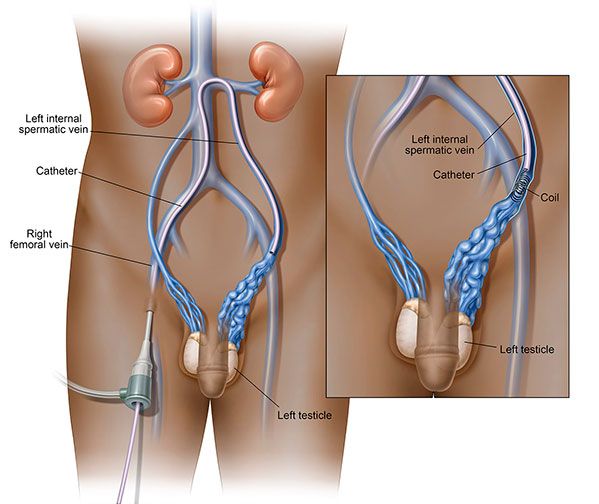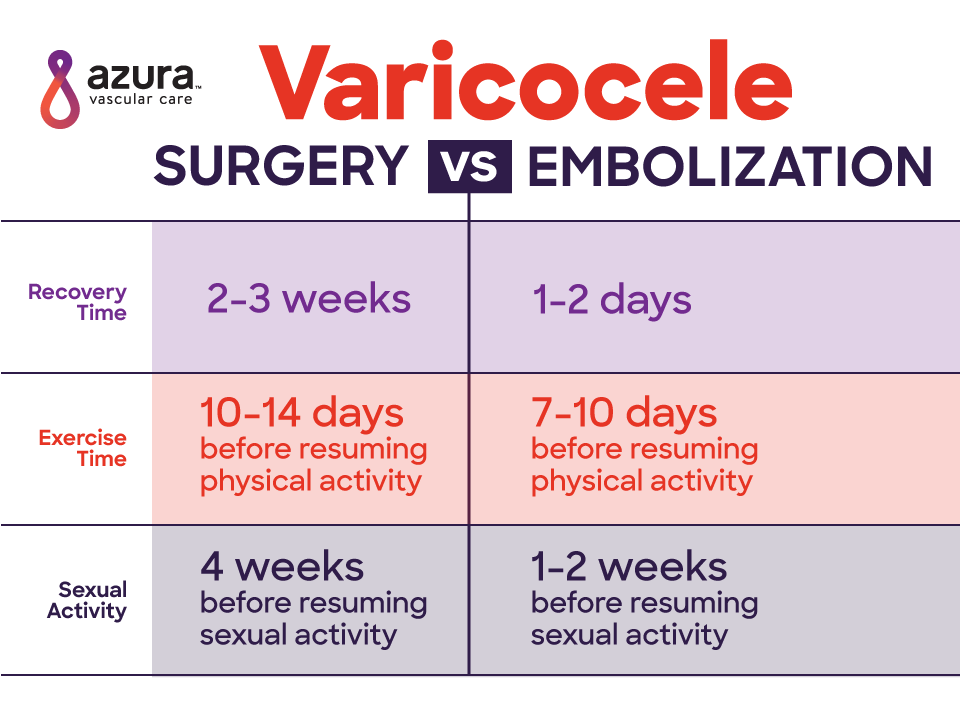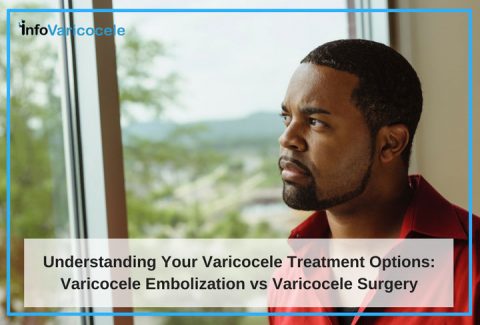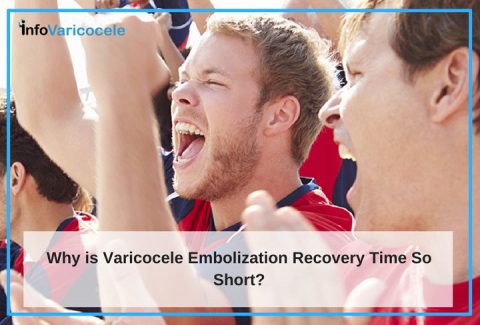
If you’ve been diagnosed with a varicocele, you may feel nervous about seeking treatment and may not be aware that there are both surgical and non-surgical options available.
Untreated varicoceles can cause ongoing pain and discomfort. You may find it hard to keep up an active lifestyle while struggling with your symptoms. Varicoceles can also affect testosterone production. Low testosterone levels may affect your weight, energy levels, and sex life. Fortunately, treatment can help correct these symptoms.
Middle-aged men in their 40s or 50s with varicoceles may be reluctant to consider open surgery to resolve symptoms due to a number of factors including hospitalization and recovery that may take significant time away from their career and/or family. For many men, varicocele embolization- a non-surgical, effective, outpatient procedure-may be a treatment option. Read on to learn more about how this procedure can improve your life.
What Is a Varicocele Embolization Procedure?
Varicocele embolization is an outpatient procedure that’s highly successful for treating varicoceles. It has a 90 percent success rate, comparable to surgical options for treating varicoceles. (i) But unlike those surgical options, varicocele embolization is minimally invasive.

The procedure typically takes less than an hour to complete. You may need to remain under observation for a while after the procedure is finished. The total time you spend at the outpatient treatment center may be up to a few hours. (ii)
During this procedure, you are not placed under general anesthesia. Instead, your doctor applies a local anesthetic to numb the incision area. If necessary you may receive medication to treat your discomfort or pain. Your doctor then makes a tiny incision in the groin area. He or she threads a catheter through the femoral vein in your groin. Finally, your doctor maneuvers the catheter through the vein in your testicles until it reaches the varicocele.
A contrast dye, injected through the catheter, is used to identify the area of the varicose vein where the embolization will take place. The catheter is used to introduce a small coil or special fluid into the varicocele. (ii) This blocks off blood flow to the varicocele and redirects it into healthy veins. Since blood is no longer flowing through the varicocele, the vein gradually shrinks and disappears.
What Are the Advantages of Varicocele Embolization?
Varicocele embolization offers several significant advantages over surgical treatments:
What Are the Risks?
It’s true that any medical procedure carries some risks. Varicocele surgery risks outweigh that of embolization. The risks associated with a varicocele embolization procedure are low and the success rate is comparable to that of open surgery. (v)
As with any procedure involving an incision, there is a slight risk of infection around the incision site. However, infections caused by a varicocele embolization are extremely uncommon. (ii)
In rare cases, some patients may have a negative reaction to the medication used during the procedure. If you decide to undergo varicocele embolization, be sure to let your doctor know about any allergies or past reactions to medications.
How Long Will It Take to Recover?
Varicocele embolization is a same-day procedure. That means you can go home soon after your procedure.
If you received a light sedative, you might be a little groggy. So it may be suggested that you have someone drive you to and home from the procedure. Plan to relax for the rest of the day and avoid making important decisions until the sedation wears off. (ii)
Varicocele embolization recovery time is relatively quick. Most patients are able to return to their regular activities within a day or two. Vigorous physical activity may need to wait for seven to 10 days. (vi) Your doctor may recommend that you delay sexual activity for one to two weeks. (ii)

How Will this Procedure Affect My Sex Life?
Untreated varicoceles can cause pain or swelling in the testicles. These symptoms can make sex difficult or uncomfortable. Varicoceles may also interfere with testosterone production. Low testosterone can cause a reduced sex drive or erectile dysfunction. (vii) Many middle-aged men struggle with low testosterone, and an untreated varicocele might make your condition worse. (viii)
Varicocele embolization can help resolve these problems. Once your varicocele has disappeared, your testosterone levels may increase. (ix) You may also find it easier to achieve and maintain an erection. Without symptoms like pain or swelling, you might feel more confident about enjoying an active sex life. Sex after varicocele treatment may be better than ever!
Am I a Good Candidate for Varicocele Embolization?
Varicocele embolization is a simple, low-risk procedure that’s safe for many men. It can be an excellent option for men who wish to avoid open surgery or who can’t safely undergo surgery or general anesthesia due to health concerns. It’s even covered by most insurance plans. It’s essential to talk with a doctor about all of your treatment options before making a decision.
Ready to learn more about varicocele embolization? Our doctors can help you find a safe, effective method for resolving your varicocele symptoms. Call 844-705-VEIN (8346) today to schedule an appointment with a vascular specialist.
Sources:
(i) Halpern, J., Mittal, S., Pereira, K., Bhatia, S., & Ramasamy, R. (2016). Percutaneous embolization of varicocele: Technique, indications, relative contraindications, and complications. Asian Journal of Andrology,_18(2):234-238. Retrieved August 6, 2018, from https://www.ncbi.nlm.nih.gov/pmc/articles/PMC4770492/
(ii) John Hopkins Medicine. Varicocele embolization. Retrieved August 1, 2018, from https://www.hopkinsmedicine.org/healthlibrary/test_procedures/urology/varicocele_embolization_135,383
(iii) Bebars, G., Zaki, A., Dawood, A., & El-Gohary, M. (2000). Laparoscopic versus open high ligation of the testicular veins for the treatment of varicocele. Journal of the Society of Laparoendoscopic Surgeons, 4(3):209-213. Retrieved August 6, 2018, from https://www.ncbi.nlm.nih.gov/pmc/articles/PMC3381636/
(iv) Kanonidou, Z., & Karystianou, G. (2007). Anesthesia for the elderly. Hippokratia 11(4):175-177. Retrieved August 6, 2018, from https://www.ncbi.nlm.nih.gov/pmc/articles/PMC2552979/
(v) Cassidy, D., Jarvi, K., Grober, E., & Lo, K. (2012). Varicocele surgery or embolization: Which is better? Canadian Urological Association Journal, 6(4):266-268. Retrieved August 6, 2018, from https://www.ncbi.nlm.nih.gov/pmc/articles/PMC3433543/
(vi) Mayo Clinic. (2017, December 27). Varicocele. Retrieved July 26, 2018, from https://www.mayoclinic.org/diseases-conditions/varicocele/diagnosis-treatment/drc-20378772 https://www.mayoclinic.org/diseases-conditions/varicocele/symptoms-causes/syc-20378771
(vii) WebMD. (2017, January 14). Low testosterone and your health. Retrieved August 1, 2018, from https://www.webmd.com/men/what-low-testosterone-can-mean-your-health
(viii) McBride, J. A., Carson, C. C., & Coward, R. M. (2016). Testosterone deficiency in the aging male. Therapeutic Advances in Urology, 8(1):47-60. Retrieved August 6, 2018, from https://www.ncbi.nlm.nih.gov/pmc/articles/PMC4707424/
(ix) Jangkhah, M., Farrahi, F., Gilani, M. A., Hosseini, S. J., Dadkhah, F., Salmanyazdi, R., & Chehrazi, M. (2018). Effects of varicocelectomy on serum testosterone levels among infertile men with varicocele.International Journal of Fertility & Sterility, 12(2):169-172. Retrieved August 6, 2018, from https://www.ncbi.nlm.nih.gov/pmc/articles/PMC5936617/



